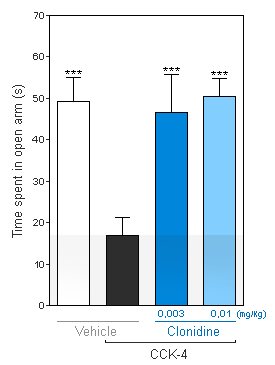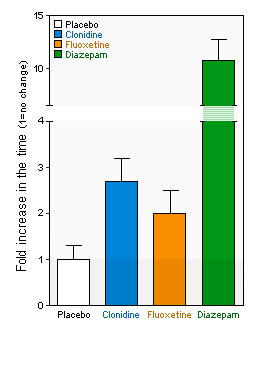Unveiling Clonidine's Unique Role and Translational Triumphs in Preclinical Models
Newsletter # 110

In vivo models
Clonidine, classified as a centrally acting alpha-2 adrenergic agonist, is not typically considered a first-line treatment for panic disorders. Nevertheless, it has been used off-label when other drugs are ineffective. Clonidine may alleviate panic disorder symptoms by reducing norepinephrine release and modulating sympathetic nervous system activity through the stimulation of central alpha-2 adrenergic receptors.
-
Clonidine normalises the panic anxiety status of CCK-4 challenged rats
Left panel :
Similar to human healthy volunteer trials, the injection of CCK-4 induces panic-like anxiety in rats, as evidenced by a significant decrease in the time spent in the anxiogenic area (open arms) during the test (white vs. black column). Treatment with clonidine prevents CCK-4-induced panic, as indicated by an increase in the time spent in the open arms. This suggests a reduced state of panic in clonidine-treated rats.
-
Right panel :
Clonidine produces an anti-panic like effect as Benzodiazepines (e.g., diazepam) and SSRI (e.g., Fluoxetine) in the preclinical rat model of panic. In the clinical setting, benzodiazepines offer rapid relief from acute panic symptoms but present a risk of dependence and cognitive impairment, while SSRIs provide a longer-term solution with lower abuse potential but may take several weeks to exert their full therapeutic effect.
Get in touch


 PREVIOUS
PREVIOUS

